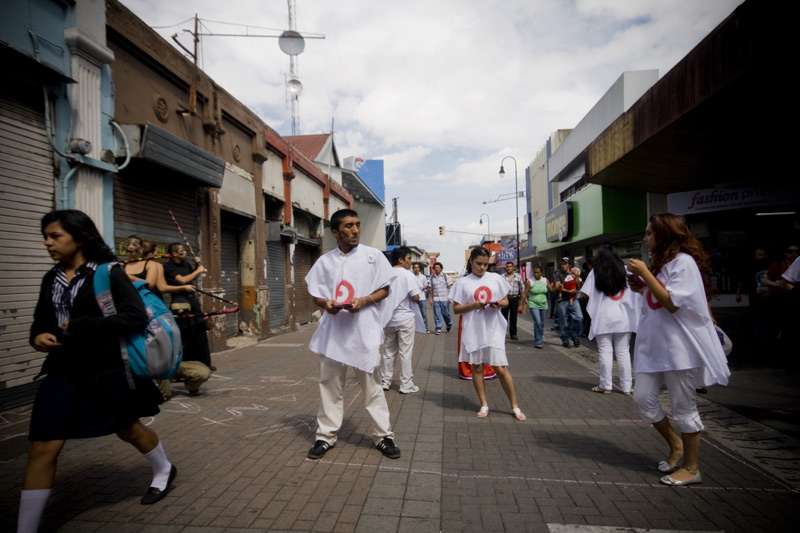- Text size
 |
|  |
|  |
| 
- Français
Costa Rican youth strives to combat xenophobia
News Stories, 14 October 2011
SAN JOSÉ, Costa Rica, October 14 (UNHCR) – Sitting around a large table in UNHCR's San José office, four young friends discuss a topical subject in Costa Rica that impacts directly on the lives of each of them. The earnest quartet – one Costa Rican, a Colombian, a Nicaraguan and a Bolivian – are members of La Red de Jóvenes sin Fronteras (Youth Network Without Borders), which was set up earlier this year to combat the spread of xenophobia among the country's youth.
Gathering a core of about 70 members – Costa Ricans, foreign migrants, refugees and asylum-seekers – the group has been active in countering negative, stereotypical perceptions about foreigners in a country that lies on a major south-north mixed migration route but where many young people oppose integration of refugees.
The young activists regularly hold small meetings to discuss the scourge of xenophobia and draw up strategies to counter it and to spread understanding about refugees and migrants and debate why they deserve to be treated fairly. Using mediums such as art, sports, theatre and social media platforms to attract young people, they are starting to make progress and setting an example in the region.
Twenty-year-old Millerland Angulo is the Colombian among the group of friends around the table. She is a refugee who made her way to Costa Rica three years ago after fleeing from persecution and conflict in her homeland. It was not long before she encountered hostility.
"When I first moved here, I remember my neighbour asking our landlord why she was renting her house to Colombians," Millerland explains, adding that the woman "strongly believed we were only here as [drug] traffickers and would bring drug-dealing to the neighbourhood."
Such ill-informed and negative perceptions about refugees are widespread, especially among young people. A national study conducted in 2010 by UNHCR found that 64 per cent of the population had an unfavourable opinion of the 12,500 refugees from more than 40 countries in Costa Rica. Within that group, 87 per cent said they believed refugees have a negative impact on society and the economy.
It was against this background that UNHCR helped establish a project called Lazos sin Fronteras (Bonds Without Borders). As part of this project, a group of about 180 young refugees, migrants, and Costa Rican nationals set up La Red de Jovenes sin Fronteras, or La Red, at a conference in February and issued a declaration of their goals.
They have received support from the Dutch government and UNHCR, which wanted a project that would promote young people as leaders of the present as well as the future. The core members of the fledgling group, with technical help from the refugee agency, mapped out a programme of activities to address the integration challenges that refugees and migrants face in Costa Rica.
Jozef Merkx, UNHCR's representative in Costa Rica, said the programme was unique and a possible model for other countries where xenophobia is a problem. "It's the first initiative where migrants, refugees and Costa Ricans are working together towards integration," he says. "It's a completely different approach to addressing the issue because the affected population is getting involved in creating a solution. It's a terrific means of providing a strong sense of empowerment to these groups," he adds.
Martha Amada, the young migrant from Nicaragua in the UNHCR office meeting, agrees with Merkx about the potential influence of La Red. "If other young people all over the world came together to do something similar to what we are doing to make a difference, then the vision of change can become reality," she says.
Part of the problem in Costa Rica is that many young people are not being taught at school about toleration. La Red is trying to bridge that gap by promoting solidarity and friendship between youth of different cultures and nations and by spreading awareness about refugees and migrants.
UNHCR's Valentina Duque, who works closely with La Red, believes that the involvement of young people in countering xenophobia is vital. "If they are willing and the desire is there, they can achieve so many great things," she says. "Their only setback is that they often lack the tools and information necessary to make significant changes. This programme was designed to give them that opportunity."
They've been busy and creative using the tools that they do have to hand. On World Refugee Day (June 20) this year, members of La Red organized a flash mob performance in San José. In July, they created a TV commercial for UNHCR's "1" Campaign.
And they have been getting results, attracting interest from prospective new members as well as important outside organizations, including the Costa Rican Youth Parliament, which has agreed to promote the objectives of La Red. This could help the group get political support for tackling important integration challenges, including access to health care, employment and education.
Eduin Jane, a 25-year-old Costa Rican member, summarizes what motivates them. "The most important thing is that, as a group, we don't believe in borders. No one place and one person is better than anyone else," he says. "Everyone may have a different nationality or live in a different country, but we are all citizens of the world."
It's a sentiment that Millerland embraces wholeheartedly. "When I first moved to Costa Rica, I didn't have any friends. I spent all of my time watching TV and felt useless," she admits. "However, now that I am in the network, I forget that I'm in Costa Rica and it feels like I'm back in Colombia – for the first time, it feels like I am home."
By Erin Kastelz in San José, Costa Rica
